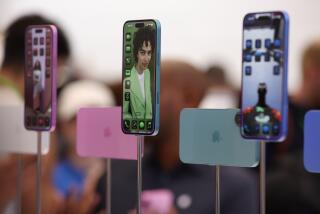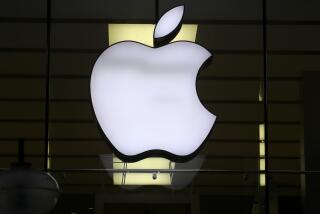Apple to unveil a new iPhone
- Share via
Will the next iPhone be thinner, cheaper, perhaps cooler? Will it come with new features such as video chat and a global positioning system? For months, speculation has swirled.
Today, Steve Jobs, Apple Inc.’s chief executive, is expected to end the guessing game and unveil the second version of the iPhone at Apple’s developer conference in San Francisco.
This is not just any updated product. Some analysts say the future of the company depends on the iPhone becoming a consumer hit of global proportions.
“Apple’s stock is going to go where the iPhone goes,” said Andy Hargreaves, senior research analyst with Pacific Crest Securities. “It’s the new growth driver.”
The key question, they say, is whether Apple, based in Cupertino, Calif., cuts the price of the iPhone to dramatically boost sales.
On June 29, 2007, Apple began selling the 8-gigabyte iPhone at $599 in the U.S., drawing lines of eager buyers outside its stores. It quickly became a cultural icon (with a cameo appearance at the Oscars) and changed the way many people viewed mobile communications.
The iPhone is a combination phone, Internet surfing gadget and digital entertainment player for listening to music and watching video. It is being rolled out slowly in international markets. Apple started selling the phone in countries such as Britain and Germany and is expected to start distributing in Asia soon.
The phone hasn’t been without controversy. Less than three months after it was launched, Apple dropped the price $200, angering many who had already bought it. And the company frustrated software engineers by limiting the kinds of development that could be done on the phone.
Meanwhile, some people began using the phone “unlocked,” without AT&T; Inc.’s cellphone service or with software applications that Apple hadn’t approved. Some of them found that their iPhones did not work after Apple issued a software update.
The company has tried to mollify grousers. IPhone owners who were angered by the price drop received $100 in store credit. Apple created a software developer’s kit for making features and services for the phone, and Jobs is expected to launch an iPhone “applications store” today that will sell programs made by outside developers.
Riding on the iPhone’s shoulders is the expectation that if it is a big success, it could spur sales of Apple’s Macintosh personal computers, analysts say. That would be similar to the way the popularity of Apple’s iPod media player is often credited with the rebound of the Mac.
People who buy iPods and had a good experience may consider buying a Mac, demonstrating the “halo effect” over Apple products. But iPod sales have been flat in recent quarters.
“If Apple can build iPhone volumes up, let’s say 20, 30, 40 million, then you will have an iPhone halo effect,” said Charlie Wolf, vice president at Needham & Co. “The iPhone becomes the crucial driver to Apple’s continued gains in PC market share. And that’s the real endgame, in my mind.”
The consensus is Jobs will announce that iPhone 2 will capitalize on a faster network as well as come with software to make the phone more attractive to both business users and consumers.
But the chief way to boost sales would be to cut the price, Wolf said. Some analysts have speculated that Apple will sell two versions of the phone -- a higher-priced one that takes advantage of the faster network and a less expensive one -- as low as $99 -- for the older version of the phone.
In one scenario, carriers, such as Apple’s U.S. partner, AT&T; Inc., could subsidize the price of the phone, with the idea that they would make up the subsidy from monthly subscribers, analysts said.
Apple “can reposition the current iPhone as an entry-level device,” said Charles Golvin, principal analyst at Forrester Research. “That will make iPhone ownership possible for people for whom the current pricing is too great an impediment.”
But Apple has to be careful that any price cut doesn’t cannibalize its other products, such as the iPod Touch, a media player with Internet surfing capabilities, which is currently at $499 for the 32-gigabyte version. Apple now sells an 8-gigabyte iPhone for $399 and a 16-gigabyte version for $499.
Other than a price cut, Apple has said it plans to improve the iPhone to make it more business-friendly. The hope is that if more businesspeople begin to use the iPhone, they may rally for Macintosh computers at the office.
“The iPhone is viewed as a Trojan horse into corporations, where the Macintosh has barely penetrated,” Wolf said.
In the last year, Apple’s shares have been on a roller-coaster ride, soaring to near $200 at the end of December and falling as low as $119. Apple shares closed Friday at $185.64.
“The first chapter of the iPhone is like an overture to a musical,” Wolf said. “We now have to get to the first act. And that begins on Monday.”
--






